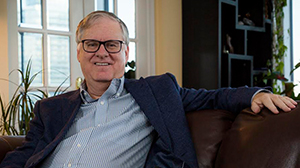

Photo courtesy of Dr. Dan Andreae
Dr. Andreae has taught a range of courses in the Psychology program at the University of Guelph-Humber – overall, he says he’s taught 45 different courses at the university and college level – and his areas of expertise span health psychology, developmental, personality and connections between cognitive and emotional processes.
Whatever the subject, Dr. Andreae says his approach is grounded in a simple educational philosophy: “where the head meets the heart.”
“The idea is to make information understandable to people so they can apply it to their own lives,” he said. “Education involves two sides: theory and application. If students can have an ‘aha’ experience and feel the theory resonates with them, they tend to be much more receptive.”
Outside of the classroom, Dr. Andreae has long been devoted to community work. He was the first Executive Director of the Alzheimer Society of Toronto and later Chair of their Patrons Council, he’s an Honourary Patron of Brain Injury Canada and Honourary Chair of the Advisory Committee of the National Eating Disorder Information Centre at Toronto General Hospital, among other involvements.
“I try to lend whatever expertise I have to help advance causes,” he said. “It takes the academic knowledge I have and makes it real. I love that connection between the town and gown, from the school to the community. That’s a big part of what education is about.”
As much as Dr. Andreae is being celebrated for his work as an educator, he stresses that it’s important to pick up on lessons from his students, as well.
“I like to find out what they think and encourage them to gain confidence in themselves and their ability to make decisions based on their own perspectives,” he said. “My class is not top-down. I’m the professor, but I want the students to feel comfortable and safe in an environment where they feel free to express themselves.
“What we’re trying to do at the University of Guelph-Humber is develop a person,” he added. “Besides the quality of the professors and facilities, it’s the community that makes it special. It’s a very supportive environment. So much of what education is about is the personal connection you make, and that’s possible here.”







